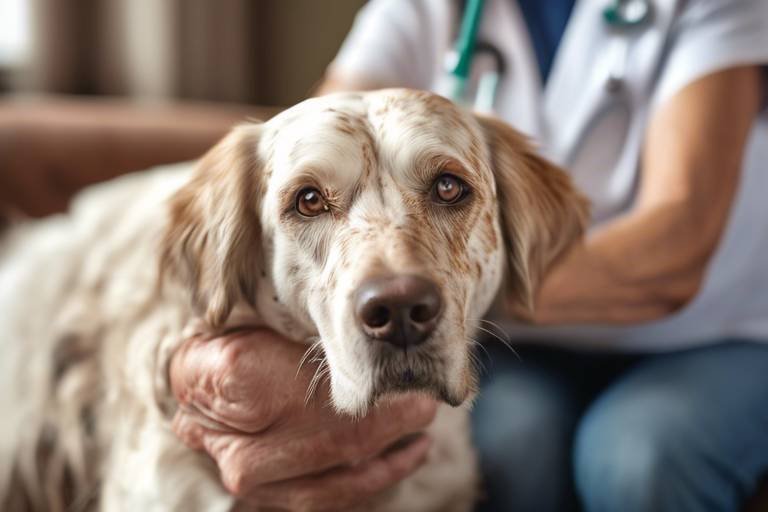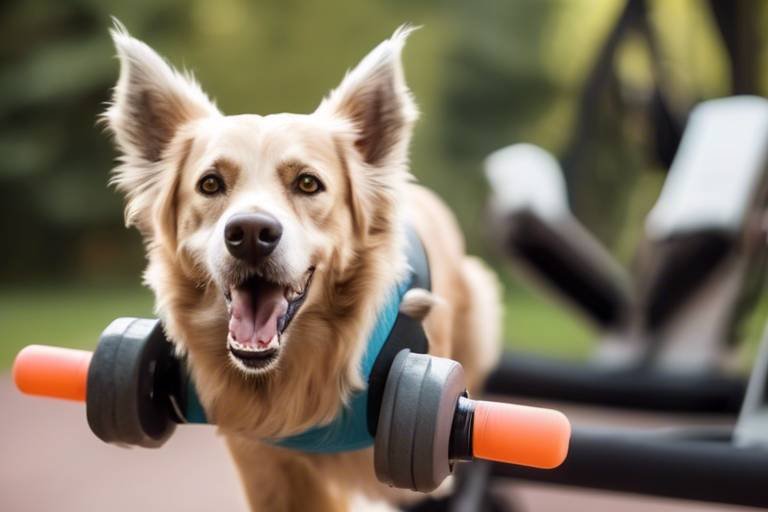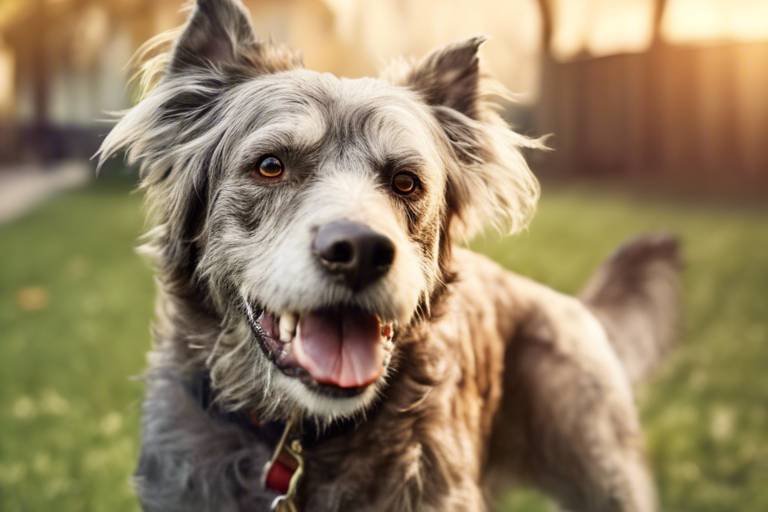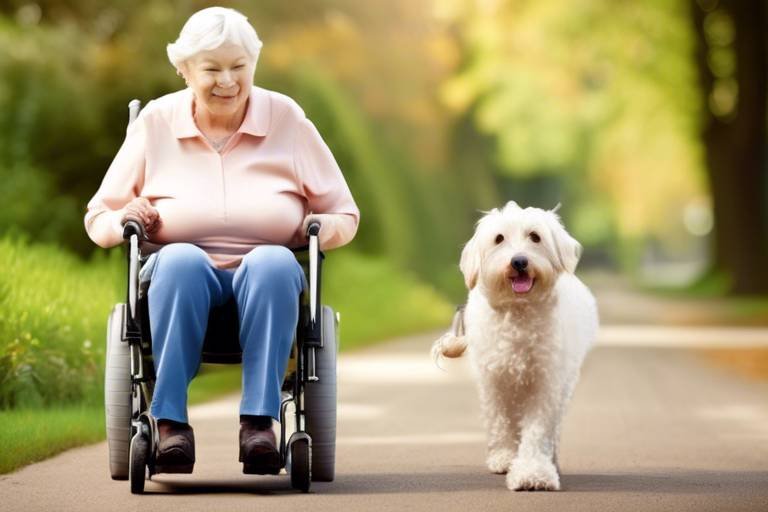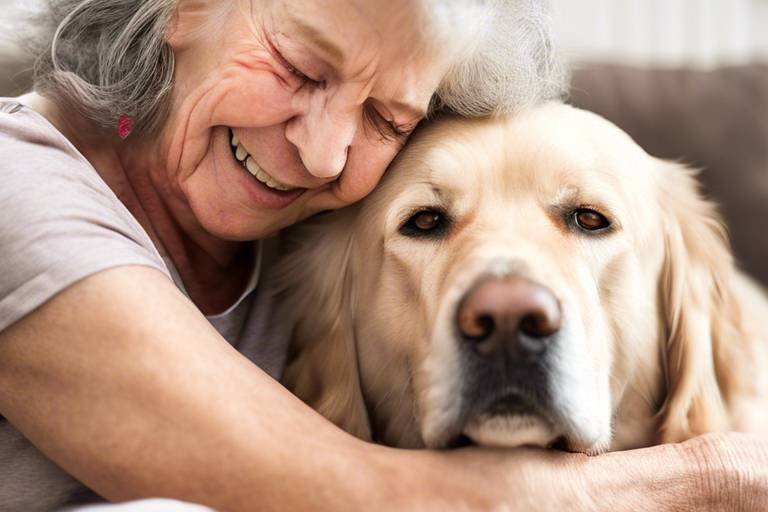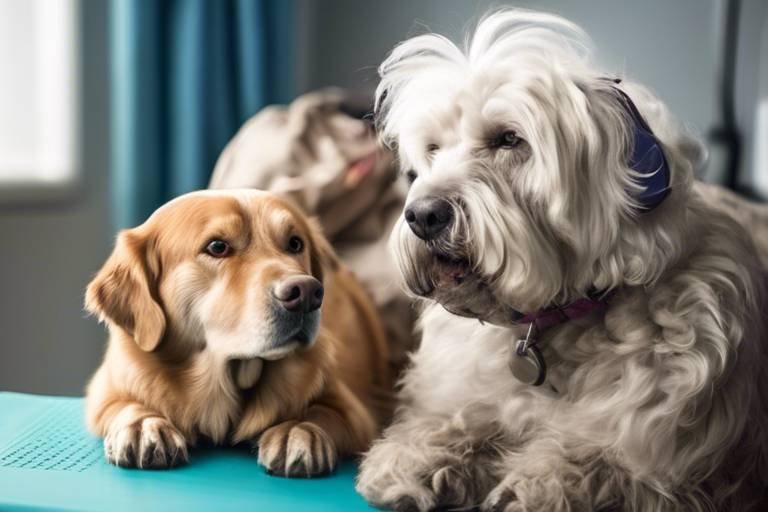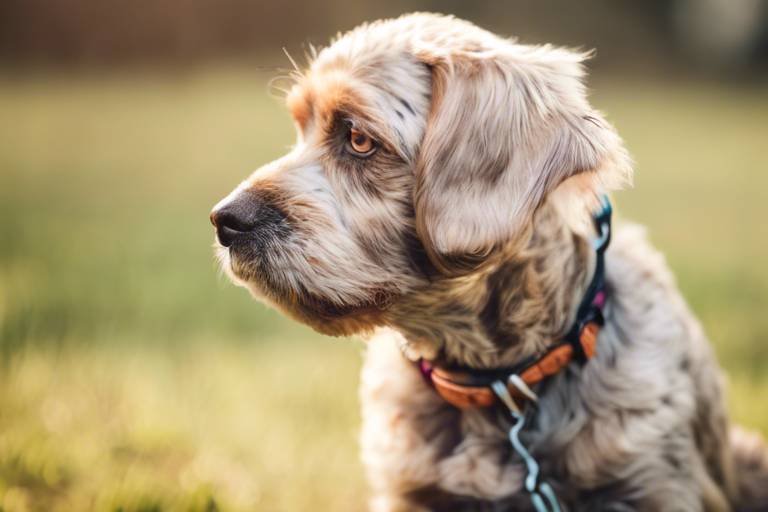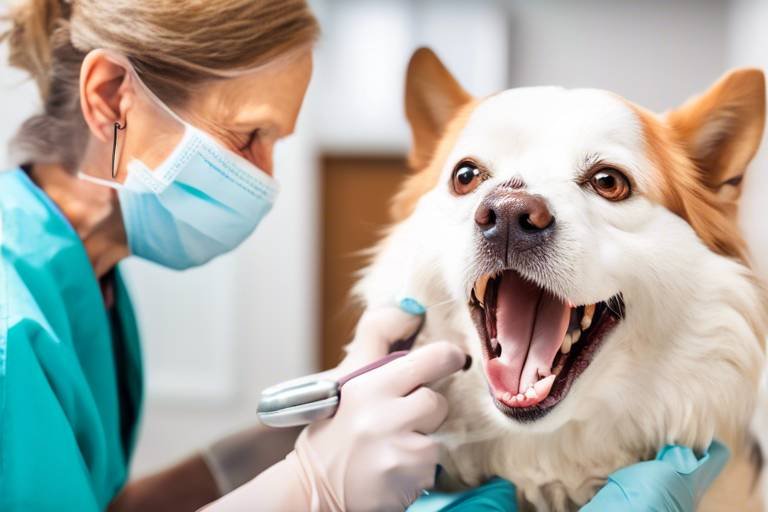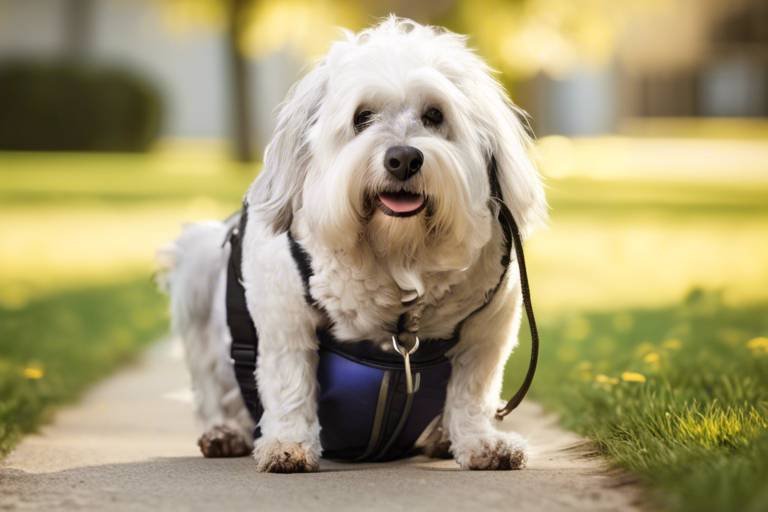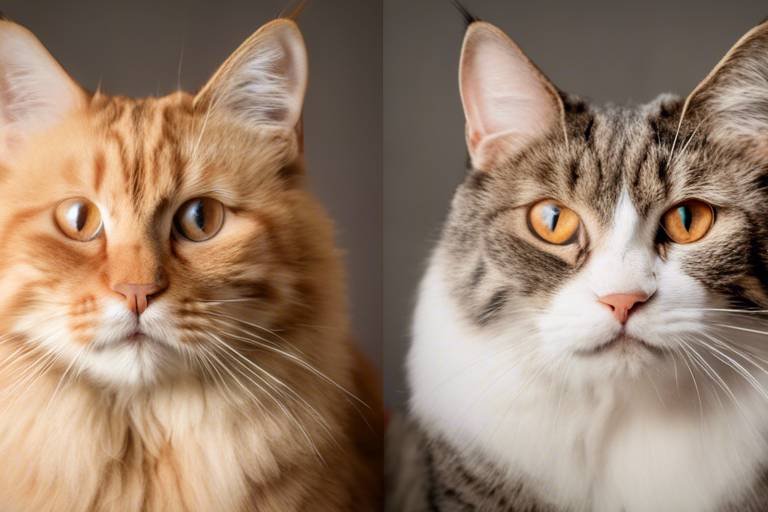Understanding Senior Pet Vaccination Needs
As our beloved furry companions age, their health needs evolve, making it essential for pet owners to understand the unique vaccination requirements of senior pets. Just like humans, older pets face a variety of health challenges, and their immune systems may not function as effectively as they did in their younger years. This is where the importance of vaccinations comes into play. Vaccines serve as a protective shield, safeguarding senior pets from diseases that could be more severe or even life-threatening due to their weakened immune systems.
Imagine your senior dog or cat as a wise elder in a community. Just as this elder would need special care and attention to ensure their well-being, senior pets require a tailored approach to their health, particularly regarding vaccinations. Not only do vaccines help prevent serious illnesses, but they also contribute to a longer, healthier life for our furry friends. In this article, we will delve into the various aspects of senior pet vaccinations, including the types of vaccines available, the health considerations that need to be taken into account, and how to create an effective vaccination schedule.
It's crucial to remember that each pet is unique; factors such as breed, previous health issues, and lifestyle can greatly influence vaccination needs. Therefore, a one-size-fits-all approach simply won't cut it. By working closely with a veterinarian, pet owners can develop a comprehensive vaccination plan that addresses their senior pet's specific needs. This collaborative effort not only enhances the effectiveness of the vaccinations but also ensures that pets remain protected against diseases that could compromise their health.
In the following sections, we will explore common vaccines necessary for senior pets, the health considerations that should be assessed before vaccination, and how to monitor your pet's reactions post-vaccination. By the end of this article, you will be equipped with the knowledge needed to make informed decisions regarding your senior pet's vaccination needs, ensuring they continue to live a happy and healthy life.
- What vaccines do senior pets need? Senior pets typically require core vaccines like rabies and distemper, along with non-core vaccines based on their lifestyle.
- How often should senior pets be vaccinated? Vaccination schedules vary; consult your veterinarian for a personalized plan.
- Are there risks associated with vaccinating senior pets? Yes, underlying health issues may affect vaccination safety, making a veterinary examination essential.
- What should I do if my pet has a reaction to a vaccine? Monitor your pet closely and contact your veterinarian if you notice any concerning symptoms.

The Importance of Vaccinations for Senior Pets
Vaccinations play a crucial role in maintaining the health of our beloved senior pets. As our furry companions age, their immune systems often weaken, making them more vulnerable to diseases that could be easily fought off in their younger years. Just like how we might need a little extra care as we grow older, so do our pets. Think of vaccinations as a protective shield, helping to fend off serious illnesses that could lead to severe health complications.
Many pet owners might wonder, "Why should I vaccinate my senior pet if they seem healthy?" That's a valid question! The truth is, even if your pet appears to be in tip-top shape, underlying health issues may be lurking beneath the surface. Vaccinations are not just about preventing diseases; they also help to boost the immune system, ensuring that it remains as robust as possible. In fact, certain diseases can progress rapidly in older animals, and a simple vaccination could be the difference between a healthy, happy life and a serious health crisis.
Moreover, some diseases that are preventable through vaccination can have devastating effects on older pets. For instance, conditions like parvovirus or distemper can be significantly more severe in senior dogs and cats, often leading to prolonged suffering or even death. By ensuring your senior pet is vaccinated, you are not only protecting them from these threats but also enhancing their quality of life. It's like giving them a second chance at vitality in their golden years!
In addition to the health benefits, regular vaccinations can also help pet owners save on potential veterinary costs in the long run. Treating diseases that could have been prevented is not only emotionally taxing but can also lead to hefty bills. Investing in vaccinations is a proactive approach to pet care that pays off in more ways than one.
In conclusion, the importance of vaccinations for senior pets cannot be overstated. They serve as a vital line of defense against potentially life-threatening diseases, ensuring that our furry friends continue to experience a joyful and active life. So, the next time you visit your veterinarian, don't hesitate to discuss your senior pet's vaccination needs. After all, a healthy pet is a happy pet!

Common Vaccines for Senior Pets
When it comes to keeping our furry friends healthy, understanding the is essential. As pets age, their immune systems naturally weaken, making them more susceptible to various diseases. This is why ensuring that senior pets receive the right vaccinations is not just a good idea; it's a necessity! So, what vaccines should you be considering for your beloved companions?
Senior pets often require specific vaccines tailored to their age and health status. The two main categories of vaccines are core vaccines and non-core vaccines. Core vaccines are universally recommended for all pets, regardless of their lifestyle, while non-core vaccines are based on individual needs and risks. Let's delve deeper into these categories.
For senior dogs, core vaccines such as rabies and distemper are vital. These vaccines protect against serious diseases that can have long-lasting effects if contracted later in life. Rabies, for instance, is not only fatal but also poses a risk to human health. Distemper, on the other hand, can lead to severe neurological issues. By vaccinating against these diseases, you're giving your senior dog a fighting chance.
Non-core vaccines may be recommended based on a senior dog's lifestyle and exposure risks. For instance, if your dog frequently interacts with other dogs at parks or doggy daycare, vaccines for bordetella (kennel cough) and leptospirosis may be advisable. Discussing these options with a veterinarian can help tailor a vaccination plan to individual needs, ensuring your furry friend is adequately protected.
When it comes to senior cats, core vaccines like rabies and feline distemper are equally essential. These vaccinations help prevent life-threatening diseases that can disproportionately affect older felines. Rabies is a serious concern, as it can be transmitted through bites from infected animals, while feline distemper can cause severe gastrointestinal issues. Keeping your senior cat up to date with these vaccines is crucial for their health.
Non-core vaccines for senior cats may include those for feline leukemia or bordetella, depending on their living environment and health status. For example, if your cat goes outdoors or lives in a multi-cat household, the feline leukemia vaccine might be a smart choice. Consultation with a vet is key to determining necessity, as they can assess your cat's lifestyle and health history to recommend the best vaccination strategy.
| Type of Vaccine | Examples | Recommended For |
|---|---|---|
| Core Vaccines for Dogs | Rabies, Distemper | All senior dogs |
| Non-Core Vaccines for Dogs | Bordetella, Leptospirosis | Based on lifestyle |
| Core Vaccines for Cats | Rabies, Feline Distemper | All senior cats |
| Non-Core Vaccines for Cats | Feline Leukemia, Bordetella | Based on lifestyle |
In conclusion, understanding the common vaccines for senior pets is crucial for their health and well-being. By ensuring they receive the appropriate core and non-core vaccines, you can help protect them from serious diseases and improve their quality of life as they age. Always consult with your veterinarian to create a personalized vaccination plan that suits your pet's unique needs.
Q: How often should senior pets be vaccinated?
A: The vaccination schedule for senior pets can vary based on individual health and lifestyle. Regular check-ups with a veterinarian will help determine the right timing and frequency for booster shots and new vaccines.
Q: Are there any risks associated with vaccinating senior pets?
A: While vaccines are generally safe, senior pets may have underlying health conditions that could affect their response. A veterinary examination prior to vaccination can help identify any potential risks.
Q: Can senior pets receive vaccinations if they are already ill?
A: It depends on the illness. Some conditions might make vaccination unsafe or less effective. Always consult your veterinarian for advice tailored to your pet's health.
When it comes to our beloved canine companions, core vaccines are absolutely essential, especially for senior dogs. These vaccines are designed to protect against serious diseases that can have devastating effects, particularly in older dogs whose immune systems may not be as robust as they once were. Think of core vaccines as the frontline defense in a battle against illnesses that could otherwise wreak havoc on your pet’s health.
The two most critical core vaccines for senior dogs are rabies and distemper. Rabies is a fatal viral disease that affects the central nervous system and is transmissible to humans, making it not only a health concern for your pet but also a public health issue. Distemper, on the other hand, is a highly contagious viral disease that can cause a range of severe health problems, including respiratory and neurological issues. Both of these diseases can be more severe in older dogs, making vaccination even more crucial.
In addition to rabies and distemper, other core vaccines may be recommended based on your dog's specific circumstances. For instance, the parvovirus vaccine is another essential immunization that protects against a highly contagious virus that can cause severe gastrointestinal illness. As a pet owner, you might wonder, “How do I know if my senior dog is up-to-date on their vaccinations?” This is where regular visits to the veterinarian come into play. Your vet can assess your dog's vaccination history and recommend a tailored vaccination plan.
It's also important to note that the timing of vaccinations can vary based on several factors, including your dog's age, health status, and lifestyle. For example, if your senior dog spends time in dog parks or around other dogs, they may be at a higher risk for diseases, making timely vaccinations even more critical. Always consult with your veterinarian to ensure you're making the best choices for your furry friend.
In summary, core vaccines are a vital part of your senior dog's health care regimen. They provide essential protection against serious diseases that can have long-lasting impacts. So, if you haven't already, make that appointment with your veterinarian to discuss your senior dog's vaccination needs—after all, a healthy dog is a happy dog!
- What are core vaccines? Core vaccines are those that are recommended for all dogs, regardless of their lifestyle, due to the severity of the diseases they prevent.
- How often should senior dogs be vaccinated? The frequency of vaccinations can vary; your veterinarian will provide a schedule based on your dog's health and lifestyle.
- Are there any risks associated with vaccinating senior dogs? While vaccines are generally safe, older dogs may have different health considerations. Always consult your vet before vaccination.
When it comes to the health of our beloved senior dogs, non-core vaccines can play a significant role in safeguarding their well-being. Unlike core vaccines, which are essential for all dogs, non-core vaccines are tailored to specific lifestyles and environmental exposures. This means that while they may not be necessary for every dog, they can be crucial for those at higher risk due to their living conditions or activities.
For instance, if your senior dog frequently interacts with other animals, particularly in a kennel or dog park setting, certain non-core vaccines become more relevant. Here are a few examples of non-core vaccines that may be recommended based on your dog's lifestyle:
- Leptospirosis: This bacterial infection can be contracted through water contaminated with animal urine. It's particularly important for dogs that spend time outdoors or near bodies of water.
- Bordetella (Kennel Cough): If your senior dog is often around other dogs, especially in boarding facilities or doggy daycare, this vaccine can help protect against a highly contagious respiratory infection.
- Lyme Disease: For dogs living in areas where ticks are prevalent, this vaccine can help prevent Lyme disease, which can lead to serious health issues if contracted.
It's essential to have a conversation with your veterinarian about these non-core vaccines. They can assess your dog's specific circumstances and recommend a tailored vaccination plan. For example, a dog that spends a lot of time hiking in wooded areas may benefit from the Lyme disease vaccine, while a city dog with limited outdoor exposure may not need it at all.
Moreover, the timing of these vaccinations can also vary. Some non-core vaccines may require boosters more frequently than core vaccines. Therefore, keeping a detailed vaccination record and scheduling regular veterinary check-ups is crucial for ensuring that your senior dog is adequately protected against diseases that could compromise their health.
In summary, while core vaccines provide a foundational level of protection, non-core vaccines can fill in the gaps based on your dog's individual lifestyle and health risks. Always consult with your veterinarian to create a comprehensive vaccination strategy that prioritizes your senior dog's health and happiness.
1. What are non-core vaccines for dogs?
Non-core vaccines are those that are not essential for every dog but may be recommended based on a dog's lifestyle, environment, and risk factors.
2. How do I know if my senior dog needs non-core vaccines?
Consulting with your veterinarian is the best way to determine if your senior dog requires any non-core vaccines. They will consider your dog's health history, lifestyle, and exposure risks.
3. Are there any side effects from non-core vaccines?
Like all vaccines, non-core vaccines can have side effects, though they are generally mild. Common reactions may include soreness at the injection site, mild fever, or lethargy. If you notice severe reactions, contact your vet immediately.
4. How often do non-core vaccines need to be administered?
The frequency of non-core vaccines can vary based on the specific vaccine and your dog's health. Some may require annual boosters, while others may last longer. Your veterinarian will provide a tailored schedule.
When it comes to keeping our feline friends healthy, core vaccines are absolutely essential, especially for senior cats. As our beloved pets age, their immune systems naturally weaken, making them more susceptible to diseases that younger cats can often fend off. Among the most critical vaccines for senior cats are the rabies and feline distemper vaccines. These vaccines serve as a protective shield against severe illnesses that can lead to dire consequences if contracted.
The rabies vaccine is not just a legal requirement in many areas; it is also a vital measure to prevent this fatal disease that can affect not only cats but also humans. Rabies is transmitted through bites from infected animals, and once symptoms appear, the disease is almost always fatal. Therefore, ensuring that your senior cat receives this vaccine is crucial for their safety and the safety of those around them.
On the other hand, the feline distemper vaccine, also known as the feline panleukopenia vaccine, protects against a highly contagious and potentially lethal virus. This virus can cause severe gastrointestinal distress and even lead to death, particularly in older cats whose immune systems are compromised. By vaccinating your senior cat, you’re not just protecting them; you’re also contributing to the overall health of the feline population in your community.
It’s important to remember that while these core vaccines are vital, they are just part of a comprehensive health plan for your senior cat. Regular veterinary check-ups are essential to evaluate your cat's health status and determine if any additional vaccinations are necessary. Your veterinarian can provide tailored recommendations based on your cat's lifestyle, environment, and existing health conditions.
In summary, core vaccinations like rabies and feline distemper are indispensable for senior cats. They not only shield your furry friend from serious diseases but also ensure that they can enjoy their golden years with vitality and joy. Always consult with your veterinarian to keep your cat’s vaccination status up to date, and remember: a vaccinated cat is a healthy cat!
- What are core vaccines for senior cats? Core vaccines include rabies and feline distemper, which protect against severe diseases.
- Why are vaccinations important for senior cats? Senior cats have weakened immune systems, making them more vulnerable to diseases that can be prevented through vaccination.
- How often should senior cats be vaccinated? Vaccination frequency can vary; it's best to consult your veterinarian for a tailored schedule based on your cat's health and lifestyle.
- Are there any risks associated with vaccinating senior cats? While vaccines are generally safe, it's essential to have a health assessment before vaccination to identify any potential risks.
When it comes to keeping our senior feline friends healthy, non-core vaccines play a significant role, especially as they age and their immune systems become less robust. Unlike core vaccines, which are essential for all cats, non-core vaccines are tailored to specific lifestyles and health risks. For instance, if your senior cat spends time outdoors or interacts with other animals, they may be at a higher risk for certain diseases, making these vaccines more relevant.
One of the most notable non-core vaccines for senior cats is the feline leukemia virus (FeLV) vaccine. This vaccine is particularly important for cats that go outside or are in contact with other cats that may not be vaccinated. Feline leukemia can lead to severe health issues, including immune system deficiencies and increased susceptibility to other infections. Another vaccine to consider is the bordetella vaccine, which can help prevent respiratory infections, especially in cats that are in close quarters with other animals, such as in shelters or boarding facilities.
It's essential to have a candid conversation with your veterinarian about your cat's lifestyle and any potential exposure risks. They can help determine whether these non-core vaccines are necessary based on factors like:
- Living environment (indoors vs. outdoors)
- Exposure to other animals
- Existing health conditions
Ultimately, the decision to vaccinate against non-core diseases should be made on a case-by-case basis. Regular veterinary check-ups can ensure that your senior cat receives the appropriate vaccinations at the right times, keeping them healthy and protected throughout their golden years.
Q: What are non-core vaccines for cats?
A: Non-core vaccines are those that are not required for all cats but may be recommended based on individual lifestyle and health risks. Examples include the feline leukemia and bordetella vaccines.
Q: How do I know if my senior cat needs non-core vaccines?
A: Consult with your veterinarian. They will assess your cat's lifestyle, health status, and potential exposure risks to determine if non-core vaccines are necessary.
Q: Are there any risks associated with vaccinating senior cats?
A: While vaccines are generally safe, senior cats may have underlying health conditions that could affect their reaction to vaccines. It's important to have a thorough veterinary examination before vaccination.
Q: How often should my senior cat be vaccinated?
A: The vaccination schedule can vary based on your cat's health and lifestyle. Regular check-ups with your vet will help determine the right timing for vaccinations and booster shots.

Health Considerations Before Vaccination
When it comes to vaccinating our beloved senior pets, health considerations are paramount. As pets age, their bodies undergo various changes that can affect their overall health and how they respond to vaccines. Before jumping into the vaccination process, it’s crucial to assess your furry friend’s health status thoroughly. A visit to the veterinarian is not just a formality; it's an essential step that can reveal underlying conditions that may impact vaccination efficacy or safety.
During the veterinary examination, the vet will likely perform a comprehensive health check, which may include:
- Physical Examination: This involves checking vital signs, assessing weight, and looking for any signs of illness.
- Blood Tests: These can provide insights into organ function and detect any hidden health issues.
- Vaccination History Review: Understanding which vaccines your pet has previously received will help in planning future vaccinations.
It's essential to communicate openly with your veterinarian about any noticeable changes in your pet's behavior or health. Have they been more lethargic than usual? Have you noticed any changes in their appetite? These observations can provide valuable clues regarding your pet's readiness for vaccination.
Furthermore, consider your senior pet's lifestyle. Are they frequently exposed to other animals or environments that might increase their risk of disease? This can influence the type of vaccines that are deemed necessary. For instance, if your dog often visits dog parks or your cat mingles with other felines, they might need additional vaccinations to protect them from specific diseases.
Lastly, it's important to remember that some senior pets may have compromised immune systems or chronic health issues, making them more susceptible to adverse reactions. Thus, a tailored approach to vaccination—one that considers both their current health and lifestyle—is essential for ensuring their safety and well-being.
Q: What should I do if my senior pet has a chronic health condition?
A: If your senior pet has a chronic health condition, it's crucial to discuss this with your veterinarian. They can provide guidance on which vaccines are essential and whether any adjustments need to be made to your pet's vaccination schedule.
Q: How often should senior pets be vaccinated?
A: The frequency of vaccinations can vary based on your pet's health, lifestyle, and the types of vaccines administered. Regular check-ups with your veterinarian will help determine the appropriate schedule for your senior pet.
Q: Are there any side effects I should watch for after vaccination?
A: Yes, common side effects can include mild lethargy, a slight fever, or swelling at the injection site. However, if you notice severe reactions like difficulty breathing or excessive swelling, contact your veterinarian immediately.

Vaccination Schedule for Senior Pets
Creating a vaccination schedule tailored to senior pets is not just a good idea; it's essential for their health and well-being. As our furry friends age, their immune systems may not respond as robustly to vaccines as they once did. Therefore, a well-structured vaccination schedule can help ensure that they remain protected against serious diseases while also taking into account their unique health needs.
Typically, the vaccination schedule for senior pets should begin with a thorough veterinary examination. This initial check-up allows the vet to assess your pet's overall health, identify any underlying conditions, and recommend appropriate vaccines based on their specific circumstances. It's crucial to have an open dialogue with your veterinarian about your pet's lifestyle, as this can significantly influence the vaccines that may be necessary.
For senior dogs and cats, core vaccines like rabies and distemper are generally administered every one to three years, depending on local laws and veterinary recommendations. However, non-core vaccines may be needed more frequently, especially if your pet has specific risk factors due to their environment or health status. For example, a senior dog that frequently interacts with other dogs at a park may need a bordetella vaccine more often than a homebound pet.
Here’s a simplified
| Pet Type | Core Vaccines | Non-Core Vaccines | Frequency |
|---|---|---|---|
| Dogs | Rabies, Distemper | Bordetella, Lyme | Every 1-3 years |
| Cats | Rabies, Feline Distemper | Feline Leukemia, Bordetella | Every 1-3 years |
After establishing a vaccination schedule, it's essential to keep a record of all vaccinations and health check-ups. This record not only helps you keep track of when boosters are due but also provides valuable information to any new veterinarian should your pet need to see someone else.
Lastly, regular check-ups with your veterinarian will help you adjust the vaccination schedule as needed. As your pet ages, their health needs may change, and staying proactive can make a world of difference in maintaining their quality of life.
- How often should senior pets be vaccinated? - Senior pets typically need core vaccines every 1-3 years, but non-core vaccines may require more frequent administration based on risk factors.
- What if my senior pet has health issues? - Always consult your veterinarian before vaccinating. They can assess your pet's health and recommend a tailored vaccination plan.
- Are there side effects to vaccinations in senior pets? - Yes, just like in younger pets, senior pets can experience side effects. Monitoring them post-vaccination is crucial.
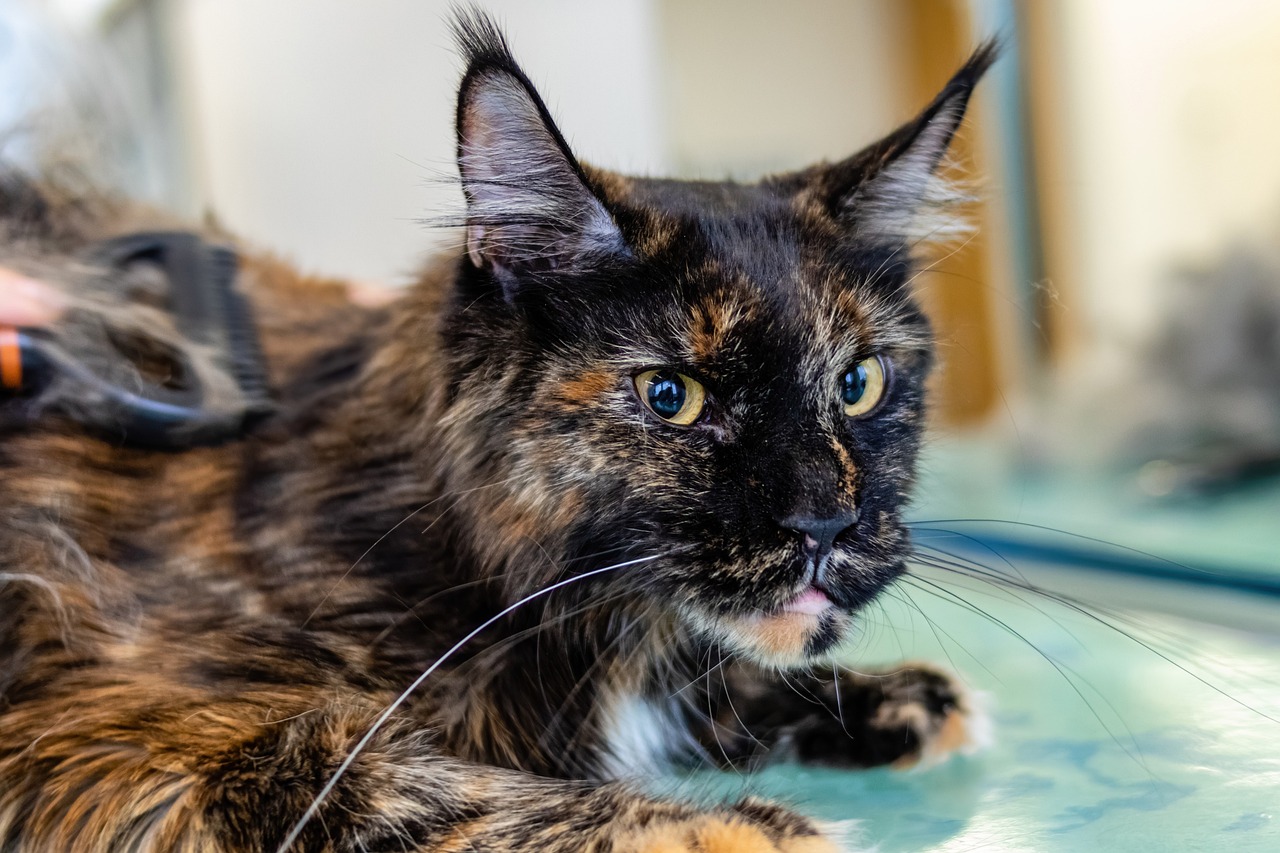
Monitoring Reactions to Vaccines
When it comes to our beloved senior pets, keeping a close eye on their health post-vaccination is paramount. Just like humans, pets can experience reactions to vaccines, and being vigilant can make all the difference in ensuring their well-being. So, what should you look out for after your furry friend receives their shots? Well, it’s essential to monitor them for any unusual behavior or symptoms that may arise.
Typically, most pets will only experience mild side effects, which can include:
- Fatigue: Your pet might seem a bit more tired than usual after vaccination, which is completely normal.
- Localized swelling: You may notice some swelling at the injection site, but this should subside within a few days.
- Loss of appetite: Some pets may show a temporary disinterest in food, but this should not last long.
- Mild fever: A slight increase in body temperature can occur, which is a normal immune response.
However, while mild reactions are common, it's crucial to be aware of more serious reactions that require immediate veterinary attention. These can include:
- Severe allergic reactions: Signs like swelling of the face, difficulty breathing, or hives should raise immediate concern.
- Vomiting or diarrhea: If your pet experiences these symptoms, especially if they are severe or persistent, it’s time to call the vet.
- Behavioral changes: If your pet becomes unusually lethargic or shows signs of distress, don’t hesitate to seek help.
To ensure you're prepared, consider keeping a vaccination log for your senior pet. This log can include:
| Date of Vaccination | Type of Vaccine | Reactions Observed | Follow-Up Notes |
|---|---|---|---|
| MM/DD/YYYY | Rabies | Mild swelling | Normal behavior resumed after 2 days |
| MM/DD/YYYY | Distemper | No reactions | Follow-up in 3 weeks |
By keeping track of this information, you can provide your veterinarian with valuable insights during check-ups and ensure that your senior pet’s vaccination history is well-documented. Remember, being proactive about their health can help catch any potential issues before they become serious.
In conclusion, monitoring your senior pet after vaccinations is a crucial part of their healthcare. By being observant and informed, you can help ensure that your furry companion stays safe and healthy. If you're ever in doubt, don’t hesitate to reach out to your veterinarian for guidance. After all, they are your best resource for keeping your pet in tip-top shape!
Q: How long should I monitor my pet after vaccination?
A: It’s a good idea to monitor your pet for at least 24-48 hours after vaccination for any adverse reactions.
Q: What should I do if my pet shows signs of a severe reaction?
A: If you notice any severe reactions, such as difficulty breathing or swelling, seek veterinary assistance immediately.
Q: Can I give my pet any medication to help with side effects?
A: Always consult with your veterinarian before giving any medication to your pet post-vaccination.
Q: Are there any long-term effects of vaccinations?
A: Most pets do not experience long-term effects from vaccinations, but it’s important to discuss any concerns with your vet.
Frequently Asked Questions
- Why are vaccinations important for senior pets?
Vaccinations are vital for senior pets because they help protect against diseases that can be more severe due to their weakened immune systems. As pets age, their bodies may not handle infections as effectively, making vaccinations crucial for maintaining their health and longevity.
- What core vaccines should my senior dog receive?
Senior dogs should receive core vaccines such as rabies and distemper. These vaccines are essential for protecting against serious diseases that can have long-lasting effects if contracted later in life. It's crucial to discuss with your veterinarian to ensure your dog is up to date on these important vaccinations.
- Are there non-core vaccines I should consider for my senior pet?
Yes, non-core vaccines may be recommended based on your senior pet's lifestyle and exposure risks. For example, if your dog frequently interacts with other dogs or if your cat goes outdoors, vaccines for conditions like Bordetella or feline leukemia might be suggested. Consult your veterinarian to determine which vaccines are appropriate for your pet.
- How can I assess my senior pet's health before vaccination?
Before vaccinating your senior pet, it's essential to have a thorough veterinary examination. This check-up can reveal any underlying health issues that may affect the safety or efficacy of vaccinations. Your vet will take into account your pet's overall health, age, and medical history.
- What should I include in a vaccination schedule for my senior pet?
A vaccination schedule for senior pets should be tailored to their specific needs, taking into account their health status and lifestyle. Regular veterinary check-ups are vital to determine the right timing and frequency for booster shots and new vaccines, ensuring your furry friend stays protected.
- How should I monitor my senior pet after vaccination?
Post-vaccination monitoring is crucial for senior pets. Keep an eye out for any side effects such as lethargy, swelling, or loss of appetite. If you notice anything unusual or concerning, don't hesitate to contact your veterinarian for guidance. Your vigilance can help ensure your pet remains safe and healthy.

